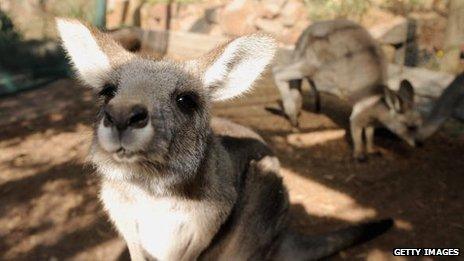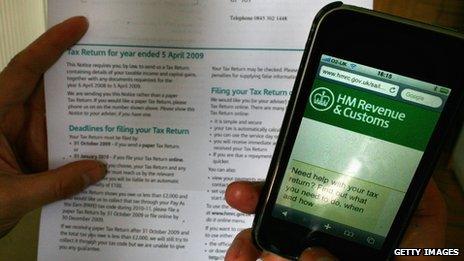Is VAT suffering a mid-life crisis at 40?
- Published

Cute as these creatures may be, the tax man says that they are still liable for the standard 20% rate of VAT
Value-added tax (VAT) is 40 years old on 1 April 2013. To mark the anniversary, VAT expert Colin Corder takes a look at some of the more bizarre rules surrounding VAT and asks if VAT legislation is in need of an overhaul.
VAT was originally touted as the "simple tax" but it has become one of the most complex and illogical.
Legislation and the courts have often struggled to keep up with a changing world and today this middle-aged tax is full of anomalies and inconsistencies.
When VAT was introduced, certain goods and services were considered so essential that it was decided they should be subject to no tax. This was done in two ways: zero-rating and exemption.
In the eyes of UK law, biscuits and cakes are necessities and are zero-rated. However, chocolate-covered biscuits are regarded as a luxury, which means the full rate of VAT is payable.
The great Jaffa Cake debate
For reasons that are not entirely clear or logical, no distinction is made between chocolate-covered cake and cake without a chocolate coating.
All this might have passed us by as a quaint aspect of British legal thinking if McVities, the makers of Jaffa Cakes, had not gone to court arguing that their product was a cake. To prove its case, McVities baked a special 12-inch Jaffa Cake that persuaded the court of its cake-like properties. As a result, no VAT is charged on Jaffa Cakes or other, more traditional chocolate-covered cakes.
An equally eccentric VAT rule applies to gingerbread men.
No VAT is charged if the figure has two chocolate spots for its eyes, but any chocolate-based additions, such as buttons or a belt, mean VAT is payable. So it's cheaper to buy no-chocolate gingerbread men.
Are you eating in or taking away?
Ever been in a cafe ordering a sandwich and wondered why the cashier is so keen to know whether you're eating in or taking away?
This is because a takeaway sandwich is zero-rated for VAT, but if you intend to eat it at the premises it is standard-rated. Asking about your intentions helps the retailer calculate the proportion of zero- to standard-rate sales. Some cafes do charge a higher amount to eat in, but most charge the same price and just lose some margin for the eat-ins.
Chancellor George Osborne seriously underestimated the public's love of the humble pasty when he announced plans to levy the 20% standard rate of VAT on hot, freshly-baked takeaway food as part of the 2012 Budget. A well documented U-turn followed in which the proposal was amended to allow food that was hot but cooling down to continue to be zero-rated.
Hence, pasties, pies and other hot takeaway food are zero-rated unless kept warm in the shop - for example, under a hot plate or in a cabinet, in which case it is standard-rated.
Live animals sold for human consumption are zero-rated, but bizarre exceptions to this have arisen over the years as some food sources have gone out of fashion or become more popular in the UK due to immigration and tourism.
For example, kangaroos are standard-rated but kangaroo steaks, now more popular as food in some UK restaurants, are zero-rated. Rabbits are zero-rated, even if sold as pets, despite the fact they have waned in popularity as a food source over the last four decades.

In recent years, VAT has dropped to 15% and then shot back up to its current 20%
And, rather topically, HMRC assumes horses are never sold for food, so they are standard rated.
Can I have a VAT receipt for that?
It's not the sort of question that might be asked by someone buying counterfeit goods, but rather peculiarly, counterfeit perfume is standard-rated for VAT. However, counterfeit money is outside the scope of VAT. Despite both activities being illegal, it has been ruled that counterfeit perfume has unfair advantage over legitimate suppliers if it isn't liable for VAT, whereas counterfeit cash doesn't have competition.
There have been a number of cases were UK courts have successfully enforced VAT payments on perfume counterfeiters.
Food for working animals is zero-rated. This has led to some quirky court rulings, including a case in 2011 where judges agreed that the standard 20% rate of VAT should be paid on ferret food because most of them are no longer used as working animals.
The decision followed detailed consultation with the Ferret Education and Research Trust.
Other unusual VAT rules:
Paperback books are zero-rated, but e-books are standard-rated
Some children's clothing incorporating fur skin is zero-rated, including rabbit, gazelles and dog skin, but not Tibetan goats which are standard-rated for VAT
Tuition provided by a sole practitioner is exempt, but if the tutor incorporates then their supplies of tuition become standard-rated
A commercial building over three years old is exempt from VAT unless the owner decides he wants it to be standard-rated and he tells the VAT man
Plain white candles are subject to no VAT in Ireland as long as they are not decorated, scented, spiralled or tapered, in which case they are subject to VAT at the standard rate
VAT remains a controversial subject in the UK, recently being used to frame political debate during recent Budget announcements. The standard rate of VAT was lowered to 15% by Alistair Darling in 2008 in a bid to kickstart growth, before being put back to 17.5% by Mr Darling in January 2010 and then being increased to 20% by the current coalition government in June 2010.
As a European tax, you could ask if VAT's days are numbered because if the UK were to leave the EU, it will be left up to the UK government to decide its future. However, as the country's third-highest yielding tax it isn't likely that it will be scrapped any time soon.
However, we may see it get a 21st century overhaul. It certainly needs one.
Colin Corder is a former HMRC VAT inspector and is now a VAT manager at Moore and Smalley Chartered Accountants, where he helps businesses to comply with VAT legislation.
The opinions expressed are those of the author and are not held by the BBC unless specifically stated. The material is for general information only and does not constitute investment, tax, legal or other form of advice. You should not rely on this information to make (or refrain from making) any decisions. Links to external sites are for information only and do not constitute endorsement. Always obtain independent professional advice for your own particular situation.